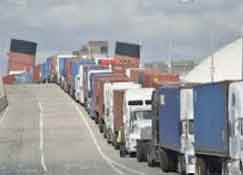After double digit declines in import volumes in the months following the US virus outbreak in March, the swoon that was expected by many to last through the 2020 peak holiday period given a still struggling economy appears to be the opposite.
Supply Chain Digest Says... |
 |
|
| With rising costs on the West Coast, some importers will be tempted to switch routes and go to East Coast ports from Asia instead. |
|
 |
|
What do you say? |
|
| Click here to send us your comments |
|
| |
|
| Click here to see reader feedback |
|
|
|
Last week, the Global Port Tracker from the National Retail Federation and Hackett Associates had a preliminary estimate of 2.06 million loaded import containers in the month of August, which if it proves accurate would be the highest monthly total since the report was first published in 2002.
As a result of those volumes, inbound logistics operations, especially at critical West Coast ports, are getting backed up, in part because many logistics firms did not staff up for such a rebound in container volumes.
"It is bursting at the seams here in Southern California," Weston LaBar, CEO of the Harbor Trucking Association, which represents trucking companies at the neighboring ports of Los Angeles and Long Beach, told the Wall Street Journal.
In fact, logistics companies say the apparent surge in volumes is leading to a supply shortage, causing a rise in domestic freight rates for services such as drayage transport.
For example, cost for intermodal transport, in which import containers are moved via rail to inland hubs such as Chicago before moving by truck to the final destination, are jumping for the first time in a while.
Rail giant Union Pacific has raised surcharges on some West Coast lanes for spot-market shippers and for customers moving more cargo than they had contracted for, the Wall Street Journal reports.
After a very weak 2020 so far in terms of overall carloads and intermodal volumes, the Association of American railroads reports that US rail carrier moved 287,339 intermodal loads the week ending September 5, some 25% more than volumes in the same week a year ago and the highest weekly total since the second week of January 2019.
(See More Below
|
CATEGORY SPONSOR: SOFTEON |
|
|
|
|
|
 In fact, after having placed many railcars in storage in recent months with plummeting container volumes, in August rail carriers took over 4000 intermodal cars out of storage to meet surging demand, according to the weekly report on volumes from the AAR. In fact, after having placed many railcars in storage in recent months with plummeting container volumes, in August rail carriers took over 4000 intermodal cars out of storage to meet surging demand, according to the weekly report on volumes from the AAR.
Trucking costs are also rising. The weekly spot load rate index from freight board operator DAT Solutions has increased to $3.16 (excluding fuel surcharge) to move a load from Los Angeles to Dallas has soared to $3.16, some three times what it was at the bottom in April.
With rising costs on the West Coast, some importers will be tempted to switch routes and go to East Coast ports from Asia instead.
Thus far, that potential trend hasn't shown up in the numbers at ports such as New York/New Jersey or Savannah, but that situation could start changing in October.
Any comments on apparently surging peak season? Are you seeing higher rates? Let us know your thoughts at the Feedback section below.
Your Comments/Feedback
|

